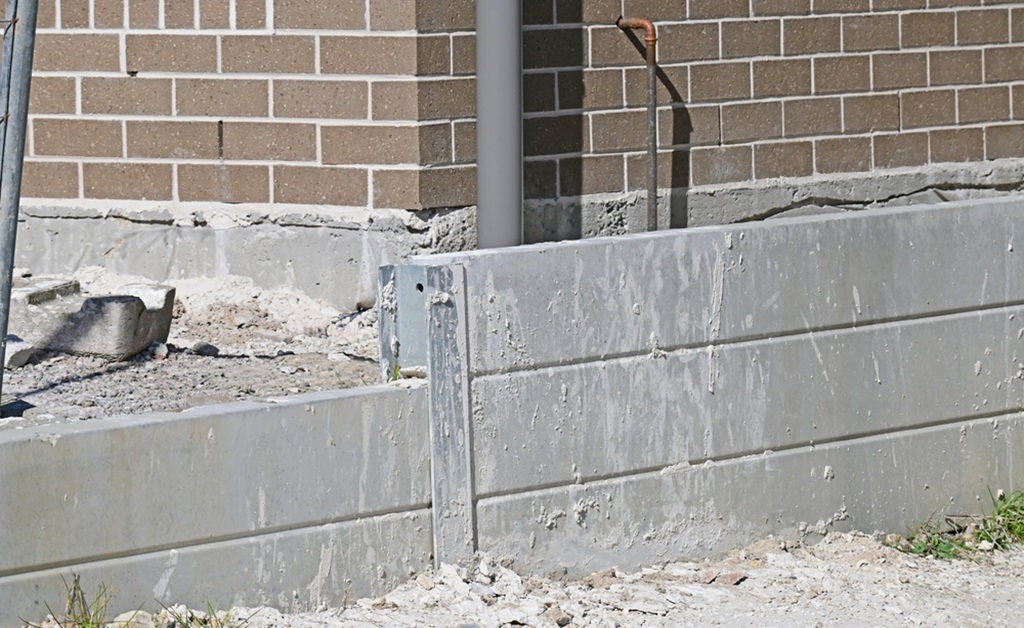Retaining wall construction is easy enough, but economizing on footings is a recipe for expensive disasters. Home and business owners often ask, do I need a concrete footing for a retaining wall? The short reply? It all comes down to your particular circumstances, but consequences of not having proper footing when you absolutely do have to have it can be dire.
What is a Retaining Wall?
A retaining wall is a structure that is built to keep back earth and stop erosion on hillside ground. Retaining walls are often employed in landscaping to provide a flat area on which to put a garden, driveway, or construction site foundation. They also defend against earth movement, which might do damage to close structures or pose a hazard. For example, a concrete retaining wall in Oklahoma City must withstand unique climate and soil conditions.
Retaining walls are made from an array of material such as poured concrete, natural rocks, concrete units, and wood. Whatever material you opt to make a retaining wall from, its resistance to soil pressure is solely reliant upon a solid foundation.
Do You Need a Concrete Footing When You Build a Retaining Wall?
The requirement for solid footing is determined by a number of variables such as wall height, site ground, and regional codes. Normally, retaining walls higher than three feet will require concrete footing for a retaining wall to allow decent support. Nonetheless, much lower walls will require footings in some situations, and knowing the proper retaining wall footing depth is essential for structural integrity.
When a Concrete Footing is Required
Footing for a concrete wall is particularly necessary when working with heavy clay soil, slow-draining ground, or freeze-thaw zones. These will exert extra pressure upon that part of the wall which will collapse if no firm support of a footing is provided.
The footings may be required by local codes, and many jurisdictions require permits on retaining walls of a particular height. Always contact your building department prior to construction so that code compliance is achieved, or work with Bill’s Custom Concrete since we know everything there is to know.
When You Can Bypass Footing
Low decorative walls below two feet in height in good drainage soil could be exempted from concrete footings. Gardening walls that face minor soil pressure can occasionally be constructed over a compressed gravel or a sandbox base. Still, even these cases do have some type of groundwork preparation. If you’re unsure how to build a concrete footing for a retaining wall, consult Bill’s or local building code resources to avoid costly mistakes.
Problems of Neglecting Footing When You Need It
Skipping concrete footing when necessary is a grave mistake that will lead to many severe issues that will cost much more than the initial cost of footing.
Wall Tilting and Collapse
Without proper footing, retaining walls often begin tilting forward due to soil pressure. This tilting starts gradually but accelerates over time, eventually leading to complete wall collapse. A collapsed retaining wall not only destroys your investment but can also damage property and create safety hazards.
Soil Washout and Erosion
Failed retaining walls allow soil to wash away during heavy rains, potentially undermining nearby structures, walkways, or driveways. This erosion can extend well beyond the original problem area, affecting neighboring properties and requiring extensive remediation.
Building Damage to Neighboring Buildings
When a retaining wall falls down, later movement of ground can prove to compromise house foundations, garage foundations, or any other structure. Foundation repairs are among homeownership’s most expensive repairs, and often cost far more than a properly constructed retaining wall would have cost in the first place.
Legislative and Insurance Matters
If your poorly constructed retaining wall collapses and injures property, you could have a problem of liability. Moreover, insurance firms might reject claims that fall under injury from construction that did not comply with appropriate construction methods or regional codes.
The Intelligent Choice When Investing
While concrete footing is an added part of your initial expense of a retaining wall, it is invaluable insurance against expensive later problems. Your small initial investment in good foundation work will preserve your property valuation and prevent calamitous failures.
It is a good idea to consult locally with specialists at Bill’s Custom Concrete to review your particular property as well as your area requirements. Professional assessment guarantees your wall will give a long-term protection to your property investment!

